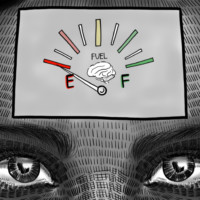[aesop_image img=”http://grantmagazine.com/wp-content/uploads/2018/03/grinchillustration.jpg” panorama=”off” offset=”-200px” credit=”Illustration by: Claire Chasse” align=”center” lightbox=”on” captionposition=”left” revealfx=”off” overlay_revealfx=”off”]
I snuggled into the green couch in my old living room, my dad sitting to the left of me. The television flickered with color as the room filled with the eerie voice of the Grinch, the “villain” in the 2000 movie rendition of “How The Grinch Stole Christmas.” A sense of terror ran through my spine, the Grinch’s bitter words contradicting his jaunty tone.
Ten years later, during this past summer, I sat down with my friend on an August afternoon, and began watching “How The Grinch Stole Christmas” once again. The Grinch had always terrified me, and as I waited for his wide-eyed grin to appear on the screen, I braced myself.
But to my surprise, I instead felt a strange sense of connection with this antagonistic character. His bitterness paralleled the cynical attitude that I had developed throughout the years. The jaunty tone of his voice was reminiscent of the one that I often used to minimize my own experiences with mental health.
This time, the Grinch felt like someone familiar, someone I could relate to. But how did I go from fearing this character to identifying with him? It was clear to me: The Grinch, like myself, suffers from a mental illness.
When I was in sixth grade, I began to deal with depression, and for the past four years I have struggled with my mental health. Many of the behaviors and emotions the Grinch displays are ones that I experience in my own life, such as sadness, irritability and isolation. As more characters were introduced in the movie, like the Whos from Whoville, it occurred to me that the relation I felt to the Grinch was not the only commentary this movie offered.
The fear and judgment the Grinch received from the Whos mirrored how people have treated and perceived me for my mental illness and, on a larger scale, how society negatively views and treats people, who, like myself, struggle with mental illness. I was scared of the Grinch as a child because I struggled to understand him.
It was easier for me to think of the Grinch as a threat and to criminalize him and his behavior rather than work to understand his experiences. Mental illness is seen as something that is unimportant in our society, and it’s something we are often told we cannot show. We fear what we don’t know and society is too afraid to take initiative to truly understand people with mental illness.
Growing up, I recognize that I was a part of the problem. Family, school and various media outlets taught me to disregard mental health issues — and I internalized it. But by the time I began to have experiences with mental health problems, I understood what it felt like to be ostracized.
I have often been isolated for my experiences with mental health. Recently in my sophomore English class, we discussed the word “crazy.” This term is perpetuated in our language, media and culture to dismiss the experiences of those who struggle from mental illness and is a word used to slander people who are perceived as different. The common mindset of my classmates reflected an “us” and “them” mentality, making me feel as though I was crazy, and that I was lesser than people who have never had mental health problems.
I soon discovered that historically, many cultures have condemned the mentally ill to “insane asylums,” reflecting how mentally ill people are viewed as inferior. They would be chained, beaten and abused. The purpose of these asylums was to separate mentally ill people from everyone else. There weren’t windows in the asylums, and inhabitants weren’t allowed access to the outside world. In the same vein, the Grinch lived on Mount Krumpet, separated from the Whos, pushed to the outskirts of the community.
In some countries, it was believed that those with mental health problems were possessed by a demonic force, so, as a treatment strategy, holes were drilled into patients’ heads to “release the demons.” Methods like electroshock therapy, insulin coma therapy, lobotomy and intentional malarial infections were often used as well in an effort to treat mental illness.
Until 2008, health care in the U.S. didn’t cover any mental health services. And to this day, the cost and availability for these services doesn’t allow everyone to get the help that they need.
Oftentimes there’s the notion that students should be able to get to class, do the work in class, and complete the homework. But in my experiences, my depressive disorder has made it nearly impossible to complete self-care habits, nonetheless these expectations. When addressing the roadblocks that have arisen for me during school, the availability of people to talk to and effective tools that I would need in order to handle the situations and stay in my classes are absent.
Last year I missed around a total of two months of school, but what mattered most to me wasn’t my education — it was my mental health.
The barriers that got in my way were rooted in a lack of understanding, perpetuated by the stigma of mental illness which can cause many complications. Relationships become obliterated because of mental health problems, finding work can be nearly impossible and getting an education can be an unlikely scenario.
Similarly, the Grinch was neglected and treated apathetically by the Whos. How would his life and his character be different if he had been supported through his pitfalls?
We need to educate ourselves about the consequences of dismissing others and we need to listen to those who experience mental health struggles. In order to have a culture where people are supported in making progress and moving towards happiness everyone must approach life with a paradigm of compassion.
Without this outlook, more suffering and excruciating emotional pain is inevitable.
In an environment where it is okay and even encouraged to ask for help, people will make progress. I had to get out of a headspace that glorified sadness before I could start on my path to recovery. When the people around you don’t want you to succeed, or don’t want you to be happy, it’s easy to become susceptible to those same thoughts and not want yourself to make progress.
We stop the stigmatization of people with mental health struggles. We need to learn from them and use our knowledge for the betterment of our own well-being. People with mental illnesses suffer enough; we need to do whatever we can to ease that pain.





Thank you for sharing this information. Love your every blog post. https://anxietyscope.com/